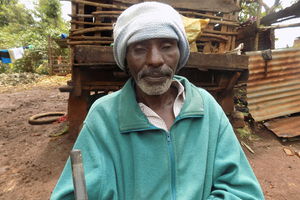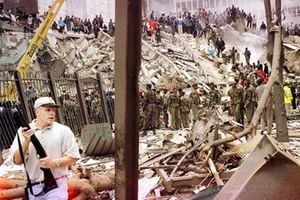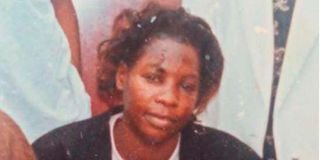
Ms Dorcas Rioba, a survivor of the 1998 Nairobi bomb blast.
The wounds from a bomb blast may have healed on the outside, but for Ms Dorcas Rioba the scars remain fresh.
As she marks the 26th anniversary of the devastating attack on August 7, 1998, at the American embassy in Nairobi, her life continues to be marred by the physical and emotional trauma inflicted on that fateful day.
The twin attacks in Nairobi and Dar-es-Salaam saw the deaths of 200 people, 11 of them in Tanzania, and 400 injured in the two capitals, the majority of them in Kenya.
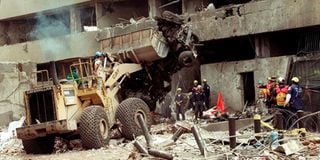
A file photo taken on August 8, 1998 shows police workers removing the remains of the car-bomb used to destroy the US embassy in Nairobi, that killed 280 Kenyans and 12 Americans.
“I used to work in fear because some people from the US Embassy used to scare us that there was a bomb and warned that we should refrain from using the lift and use the staircase. This was from 1995. That day, I went to the 15th floor where teachers were being posted. My colleague wanted us to engage in our normal banter but I warned him because I felt like it was too early for that,” Ms Rioba recalls.
She vividly recalls the chaos of that day—the deafening roar, the blinding light, and the overwhelming panic.
She was among the lucky few who survived, but the price she paid was enormous.
The blast left her with permanent injuries, including shrapnel embedded in her body that continues to cause her pain.
"The physical pain is constant. My jaw was badly injured and I still have shrapnel around my left eye and thighs from the glass," she says, adding that the chaos that ensued sent terrified people scrambling for safety.
Flames
She described how, while others rushed to the windows, she tried to find a way out through the stairs, only to find that they had been destroyed.
The group was trapped, caught between a wall of flames and a deadly cloud of smoke, with nowhere to go.
They were paralysed with fear and confusion.
She recalls how the terrorists, blocked at the entrance to the embassy, threw their first grenade, apparently aimed at eliminating the security officers who were blocking the perpetrators' entry.
It was after this first grenade went off that the truck bomb exploded, which explains the second large explosion heard by Ms Rioba and many other witnesses.
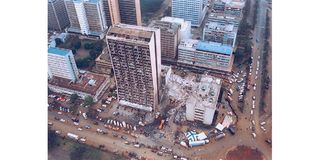
An aerial view of the aftermath of bombing of the US embassy in Nairobi. The bomb blast in Nairobi left 218 Kenyans and Americans dead and another 5,000 injured. There was a simultaneous bomb attack in Dar es Salaam on the same day.
"After the first grenade attack, I was not sure of my surroundings. After the second big explosion, I felt something warm pouring over me and didn't realise it was my own blood. Officers who appeared to be Administration Police (AP) carried me through the back door to the ambulance and we were taken to Kenyatta National Hospital," she said.
Read: Senators push for 1998 blast compensation amid claims majority of victims will not get anything
Her heart was pounding with panic as her mind screamed at her to escape the hospital and rush to her three-month-old baby. She could barely think straight, her mind consumed by the desperate need to be with her child and make sure they were safe.
“The medics stitched our wounds to prevent excessive loss of blood from our bodies. We were sharing the hospital beds, two per bed. My sister travelled from Kisumu after receiving the bad news. My mother suffered blood pressure after getting the news from the radio. My husband who was in Masaba Hospital was discharged the same day as I was,” Ms Rioba recalls.
The fear of leaving her baby behind was overwhelming. Besides, her husband worked in the same building, on the 13th floor in the accounts department. She also had her brother-in-law there, and the thought of them all being in danger only added to her anxiety. The turmoil inside her was unbearable as she struggled to hold on to hope amidst the chaos.

A section of Ufundi Sacco building in Nairobi after the 1998 terrorist bomb blast. In the background is the US embassy. Photo/FILE
“My baby had sucked his finger and now the skin had peeled off,” she recalls.
"I have given up waiting for compensation from the government because I have already lost my mother and my sister. It was difficult to deal with my child, because now I avoided him because of the stitches, I did not want to frighten him. I went to therapy, which helped to reduce the burden of the bomb blast. The doctor advised me to have an operation to remove the shrapnel as it could cause further injuries,” she added.

